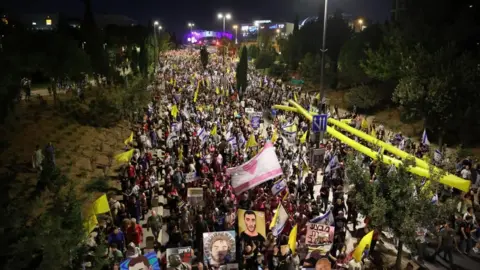Over the last five days, Rima, a 45-year-old Druze woman from Suweida, has witnessed scenes she never thought possible in her once peaceful community. With fear gripping her as she sheltered in her home, she recounted to the BBC the pervasive sense of dread as government forces and foreign fighters combed her neighborhood, seeking their next victim. "There were bodies everywhere outside our building," she said, via phone, using a pseudonym for safety. Her account reveals a city overtaken by violence, following rising tensions between the Druze and Bedouin tribes that erupted into deadly sectarian clashes over a kidnapped merchant.
The instability has reached alarming levels as interim President Ahmed al-Sharaa’s administration claimed it would deploy security forces to restore order. As government troops moved in, the situation quickly deteriorated into larger scale violence, with accusations from both the Druze community and monitoring groups of government forces engaging in brutal assaults against civilians. Reports indicate that at least 594 people have been killed, including many unarmed Druze civilians.
Witness reports from Nayef, a government employee, echo Rima's terror. He described gathering the bodies left on the streets, witnessing government forces storming wealthier neighborhoods, looting, and opening fire on civilians. Eyewitness footage supports claims of indiscriminate violence, including armed men shooting at residents, underscoring a chaotic environment where uncertainty is rampant.
Both Rima and Nayef articulated their despair and loss of trust in the government’s ability to protect them amid this crisis. With government forces rumoured to comprise former Islamist fighters, the Druze community's safety appears increasingly compromised. The UN human rights office has documented numerous incidents of violence, including an attack that resulted in collective executions.
Making matters more complicated, Israeli military actions in response to the violence have sparked a sense of mixed allegiance and resentment among the Druze. While some see Israel's airstrikes as protective interventions, others like Nayef insist on their nationalism, stating, "Nobody wants Israel." The government's promises to uphold Druze safety have been met with skepticism, reminiscent of previous failed protections during earlier conflicts.
The violent clashes have led to displacement within the community, with many worrying about long-lasting repercussions from this episode of sectarian strife. The eerie silence of the government amidst ongoing violence provides little comfort for residents looking for security, while their trust in local authorities dwindles dangerously. As Suweida grapples with the aftermath, the future remains uncertain for its residents caught in this complex web of local and regional conflicts.
















